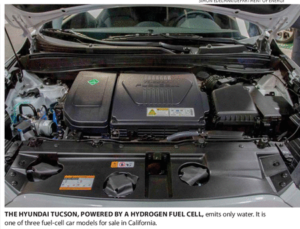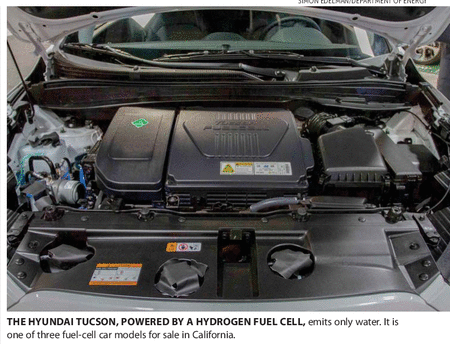15 October 2017. The pros and cons of hydrogen-powered cars and trucks have been discussed over the years, so I’m mostly refreshing the discussion, in light of recent news – e.g., in the September 2017 issue of Physics Today is an article entitled “Hydrogen-powered vehicles: A chicken and egg problem.” Yes, any new technology needs infrastructure to spread and thrive, and insfrastructure goes to a thriving technology. A delicate balance of hope and hard-headed pragmatism allows growth to start. Hydrogen-powered vehicles, or HPVs, are now for sale in California. The Physics Today article reviews the technological challenges and advances, particularly in catalyst formulations.
In that article is a look under the hood of a Hyundai HPV:

What are the pros and cons of HPVs?
Pros:
- No greenhouse gas or pollutant emissions at the vehicle; they occur, at a lesser rate than that of emissions from directly fossil-fueled vehicles, at the plant producing H2 .
- Potential to produce the energy source, H2, from non-fossil sources such as solar photochemistry.
Cons:
- There is a relatively low first-law efficiency of electrolyis to split water into H2 and O2. There is an overvoltage, above the 1.2 V (depending upon conditions) as theoretical minimum, that results in about 55% as much enthalpy (heat equivalent, essentially) being embodied in the H2 product as in the electrical energy input. Overvoltage is reduced with expensive and limited platinum-group metals.
- Hydrogen can be stored in cars in two ways, each with drawbacks. Liquefaction of H2 is costly in energy and money. Compression is less energy-costly, though still significant in cost, and there is a major limitation on how much fuel can be packed into the space available in a vehicle (H2 has to be adsorbed into a material that takes up much more space and weight than the H2). One might also worry about the safety of liquid or of pressurized gas in a collision. Modern fuel tanks do exceptionally well with flammable fuels, but these have minimal vapor pressure.
- If hydrogen is produced from fossil fuels, there are emissions of CO2 in the process. They broadly compare with those from direct fossil-fuel use. If nuclear fusion becomes a practical source of electrical power, this may be moot, but fusion has proved to be a very refractory problem over half a century.
- One more thing, noted, as I recall, by Ken Caldeira at the Carnegie Institution, is that inevitable leakage of H2 all along the supply and use chain would eventually turn the atmosphere from its current state as oxidative to a state of being reductive. This would change the natural atmospheric processing of pollutants, in ways not yet predicted.
Battery-powered vehicles, a la Tesla, are more promising, for efficiency, adaptability to current infrastructure, and cost. They have a different set of pros and cons, including the possibly limited supply of battery materials. More on that, elsewhere.

